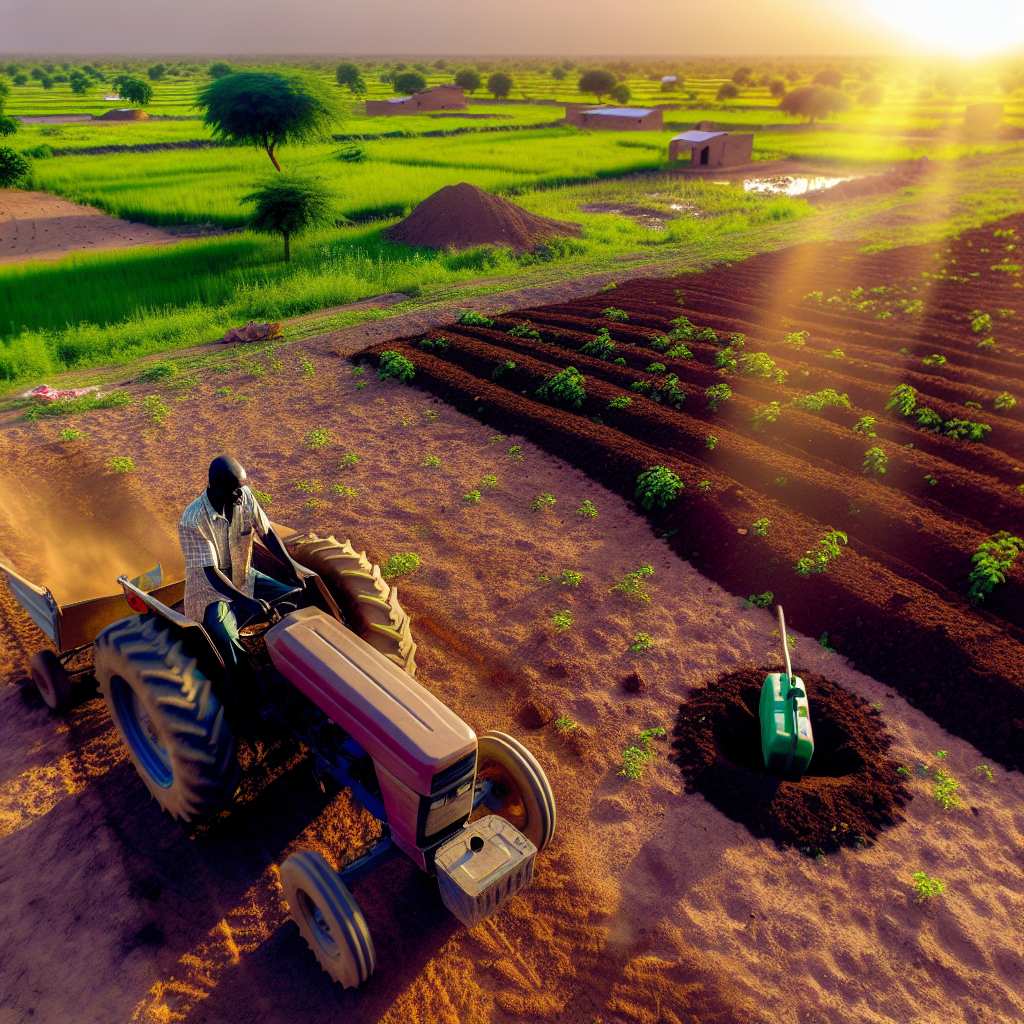Introduction
Agriculture in Nigeria has seen a gradual shift towards mechanization in recent years.
This shift involves the use of modern farm machinery and technology to carry out various agricultural activities.
Mechanization plays a crucial role in improving productivity and efficiency in Nigerian agriculture.
By replacing traditional manual labor with machines, farmers are able to increase their output.
This transition helps to reduce the amount of time and effort required for farming tasks.
Benefits of Mechanization
Mechanization in Nigerian agriculture has brought about numerous benefits that have positively impacted the sector in various ways.
Increased Productivity and Efficiency
Mechanized agriculture allows farmers to accomplish tasks in a shorter period.
This approach increases their overall productivity.
By using modern machinery such as tractors, planters, and harvesters, farmers can cover more land and plant crops more quickly.
This efficiency translates to higher yields and better profitability for farmers.
Reduction in Labour Costs
One significant advantage of mechanization is the reduced need for manual labor.
Farmers can now rely on machines to perform tasks that were previously labor-intensive.
This leads to cost savings on hiring and managing labor.
Farmers can invest in other aspects of their operations, ultimately improving their bottom line.
Improved Quality of Produce
Mechanization ensures more precise and uniform cultivation practices.
This results in higher quality produce.
Modern machinery helps farmers control seed placement, spacing, and depth.
This ultimately leads to healthier crops with better yields.
Additionally, mechanized harvesting techniques ensure that crops are harvested at peak ripeness.
This enhances their overall quality.
Timely Operations Leading to Better Yields
By using mechanized equipment, farmers can carry out agricultural operations such as planting, irrigation, and harvesting in a timely manner.
Timely cultivation and harvest mean that crops are not left in the field for extended periods.
This reduces the risk of spoilage and pest infestation.
Farmers can achieve better yields and maximize their profitability.
The benefits of mechanization in Nigerian agriculture are evident in the increased productivity, reduced labor costs, improved quality of produce, and timely operations that lead to better yields.
Embracing mechanization is essential for the continuous growth and development of the agricultural sector in Nigeria.
CHALLENGES OF MECHANIZATION
High cost of machinery and equipment. Mechanized farming requires expensive tools and machinery that small-scale farmers may not be able to afford.
Lack of access to credit for small-scale farmers. Many farmers struggle to secure loans and funding to invest in mechanized equipment.
Limited availability of spare parts and maintenance services. Without access to essential spare parts and maintenance services, farmers may face downtime and reduced productivity.
Resistance to change traditional farming methods. Some farmers may be hesitant to adopt mechanized practices due to a preference for traditional farming methods.
While mechanization in Nigerian agriculture offers numerous benefits, there are also significant challenges that need to be addressed to ensure its successful implementation and adoption.
By addressing issues such as high costs, access to credit, availability of spare parts, and resistance to change, the agricultural sector can harness the full potential of mechanization to improve efficiency and productivity.
Explore Further: Land Surveying Tools and Technologies in Nigeria
Initiatives to Promote Mechanization
Government subsidies play a crucial role in promoting mechanization in Nigerian agriculture.
By providing financial assistance and incentives for purchasing machinery, the government encourages farmers to invest in modern equipment.
This can increase efficiency and productivity on their farms.
Training programs are another key initiative to promote mechanization.
By educating farmers on modern agricultural practices and how to operate machinery effectively, these programs help bridge the skills gap.
They ensure that farmers can make the most of the technology available to them.
Collaborating with the private sector is essential for driving investment in mechanization.
Transform Your Career with Expert Guidance
Get personalized mentorship consulting that’s tailored to your unique path. Our expert advice is actionable and exclusive.
Get StartedBy partnering with companies that specialize in agricultural machinery, the government can leverage external expertise and resources.
This collaboration expands access to modern technology for farmers across the country.
Research and development are also critical for developing appropriate technology for Nigerian agriculture.
Investing in innovation creates tailor-made solutions that address the specific needs and challenges of local farmers.
Researchers can help drive the adoption of mechanization in the sector.
These initiatives to promote mechanization in Nigerian agriculture are essential for driving sustainable growth.
By incentivizing investment, providing training, fostering collaboration, and supporting research and development, stakeholders can work together.
They can harness the full potential of mechanization and improve the livelihoods of farmers in Nigeria.
- Government subsidies and incentives for purchasing machinery
- Training programs for farmers on modern agricultural practices and machinery operation
- Collaboration with private sector for investment in mechanization
- Research and development to create appropriate technology for Nigerian agriculture
Learn More: Surveying Data Management and GIS Software
Impact of Mechanization on Rural Communities
Mechanization in agriculture has led to the creation of employment opportunities in machinery operation and maintenance.
As more machines are used in farming, there is a need for skilled workers to operate and maintain them.
This has helped in reducing unemployment rates in rural areas and providing alternative sources of income.
Furthermore, mechanization has significantly reduced the drudgery and health hazards associated with manual labor.
Manual labor in agriculture often involves heavy lifting, bending, and repetitive tasks that can lead to musculoskeletal injuries.
By using machines for various farming activities, farmers can avoid physical strain and work more efficiently.
The adoption of mechanization has also led to an improvement in living standards and socio-economic development in rural communities.
Increased productivity and efficiency in farming operations have resulted in higher income levels for farmers.
This additional income can be invested in education, healthcare, and other essential services, ultimately improving the quality of life in rural areas.
Overall, the impact of mechanization on rural communities has been overwhelmingly positive, offering numerous benefits and opportunities for growth.
By embracing modern technology and machinery, these communities can continue to thrive and progress towards a more sustainable future.
Delve into the Subject: Role of Land Surveying in Environmental Impact Studies

Sustainability and Environmental Concerns
The integration of mechanization in Nigerian agriculture comes with its own set of challenges.
Particularly, these challenges involve sustainability and environmental impact.
It is essential to consider these factors to ensure the long-term success of mechanized farming practices.
Need for proper waste management and disposal of machinery
As more machinery is introduced into Nigerian agriculture, the issue of waste management becomes crucial.
Proper disposal of old or damaged machinery is essential to prevent environmental pollution.
Farmers and agricultural companies must have a well-defined plan for the proper disposal of machinery.
This will help minimize their impact on the environment.
Soil compaction and erosion caused by heavy machinery
One of the significant concerns associated with mechanization in agriculture is soil compaction.
Heavy machinery can lead to erosion as well.
The repeated use of heavy tractors and other equipment can reduce soil fertility.
This diminishes the soil’s ability to retain water.
As a result, erosion and loss of topsoil can increase.
Farmers must implement measures to mitigate soil compaction.
These measures include reducing the weight and frequency of machinery use.
Implementing conservation tillage techniques helps as well.
Using cover crops to protect the soil is beneficial too.
Promotion of sustainable farming practices alongside mechanization
While mechanization can increase efficiency, it is essential to promote sustainable farming practices.
This ensures the long-term health of the environment.
Farmers should incorporate practices such as crop rotation and integrated pest management.
Conservation agriculture alongside mechanization helps maintain soil fertility.
These practices also reduce chemical inputs and preserve biodiversity.
By combining mechanization with sustainable farming practices, Nigerian farmers can achieve higher yields.
This can be done without compromising the environment’s health.
Uncover the Details: Influence of Climate on Nigerian Architectural Designs
Implications of Mechanization in Nigerian Agriculture
Mechanization in Nigerian agriculture offers numerous benefits.
It increases productivity, efficiency, and profitability.
However, it also presents challenges.
High costs, limited access to machinery, and displacement of labor are significant issues.
To address these challenges and promote sustainable practices, stakeholders must invest in infrastructure.
Providing training and support for small-scale farmers is essential.
Adopting appropriate policies and regulations will help transform the sector.
By working together, the government, private sector, and farmers can harness mechanization’s potential.
It is crucial to balance modernization with preserving traditional practices.
Ensuring food security for the nation must remain a priority.
Additional Resources
Tractor acquisition and agricultural performance among Nigerian …
(PDF) The Role of Mechanized Agriculture in a Developing Economy




